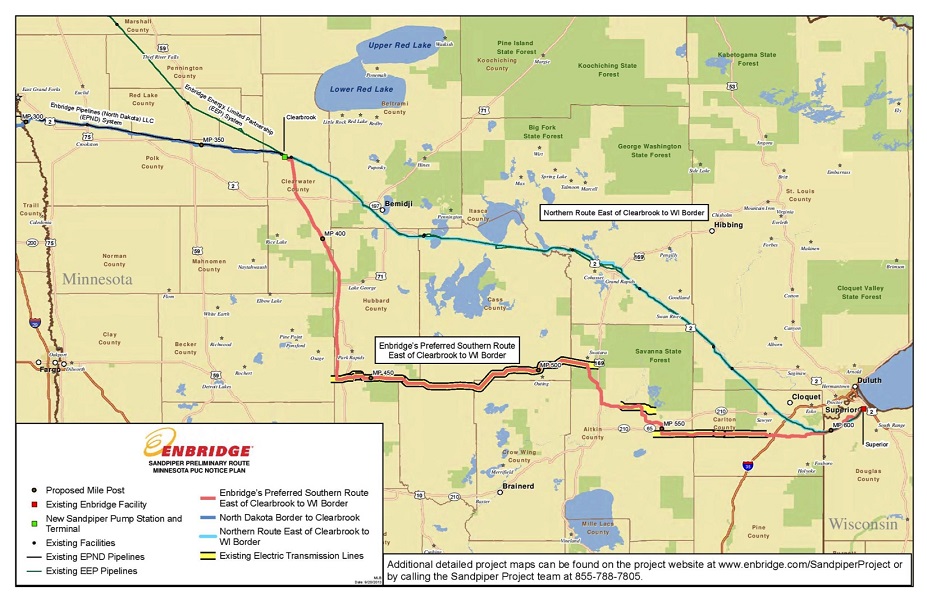Court: Environmental Study Still Required for Sandpiper Oil Pipeline Certificate

MINNEAPOLIS (AP) — The Minnesota Court of Appeals has reversed regulators’ decision to grant a certificate of need for the proposed Sandpiper oil pipeline, saying Monday that state regulators must complete an environmental impact statement before the certificate can be issued.
The appeals court sent the issue back to the Minnesota Public Utilities Commission to conduct an environmental review and reconsider whether a certificate should be granted.
Minnesota regulators granted the certificate in June, saying the $2.6 billion, 610-mile pipeline from North Dakota’s Bakken oil fields to Superior, WI, was necessary and in the public interest. A lengthy environmental review of Enbridge Energy’s project was set to take place as officials determined the pipeline’s final route.
But a three-judge panel of the appeals court said Monday that the certificate constituted a major governmental action, so state law requires the environmental impact statement be completed before that certificate is granted.
No one disputed that the pipeline would be subject to environmental review, but the timing of a review was at issue.
Traditionally, the certificate of need and routing permit proceedings for pipelines are conducted at the same time, but in this case, the commission conducted certificate of need proceedings first.
The Friends of the Headwaters argued that conducting certificate of need proceedings before completing an environmental impact statement violated the Minnesota Environmental Policy Act. The appeals court agreed.
The court also said that conducting an environmental impact statement early in the process ensures “decision-makers are fully informed regarding the environmental consequences of the pipeline, before determining whether there is a need for it. Moreover, completion of an EIS at the initial certificate of need stage seems particularly critical here because once a need is determined, the focus will inevitably turn to where the pipeline should go, as opposed to whether it should be built at all.”
Calgary, Alberta-based Enbridge has argued that Sandpiper is needed to move the growing supply of North Dakota crude oil safely and efficiently to market. The company has said the project would also ease rail congestion and create about 1,500 construction jobs.
But environmentalists and tribal groups said the risk of leaks is too high, including where the route would run through the headwaters of the Mississippi River.
North Dakota regulators have already approved Sandpiper.
Separately, North Dakota drillers are still producing oil at a near-record pace despite depressed crude prices.
The Department of Mineral Resources says the state produced an average of 1.2 MMbpd in July, down slightly from June. The July production was 27,000 bpd less than the record set in December.
North Dakota also produced a record 1.65 MMcf of natural gas in June.
The July tally is the latest figure available because oil production numbers typically lag at least two months.
Related News
Related News

- Kinder Morgan Proposes 290-Mile Gas Pipeline Expansion Spanning Three States
- Enbridge Plans 86-Mile Pipeline Expansion, Bringing 850 Workers to Northern B.C.
- Intensity, Rainbow Energy to Build 344-Mile Gas Pipeline Across North Dakota
- U.S. Moves to Block Enterprise Products’ Exports to China Over Security Risk
- Court Ruling Allows MVP’s $500 Million Southgate Pipeline Extension to Proceed
- U.S. Pipeline Expansion to Add 99 Bcf/d, Mostly for LNG Export, Report Finds
- A Systematic Approach To Ensuring Pipeline Integrity
- 275-Mile Texas-to-Oklahoma Gas Pipeline Enters Open Season
- LNG Canada Start-Up Fails to Lift Gas Prices Amid Supply Glut
- TC Energy’s North Baja Pipeline Expansion Brings Mexico Closer to LNG Exports




Comments